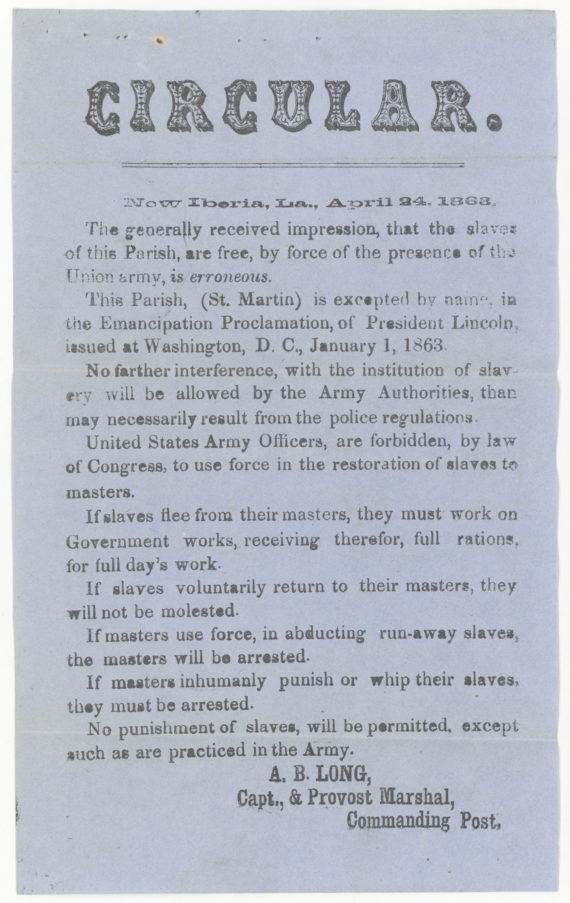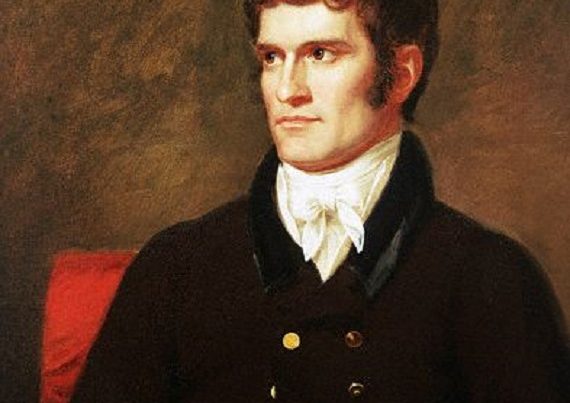On June 19, 1865, Union forces arrived in Galveston, Texas and declared to the population of that state that the Emancipation Proclamation had freed its slaves. Called “Juneteenth,” it was initially celebrated in Texas, but it is now recognized in one way or another by 45 states and the District of Columbia. But what is it a celebration of? President Abraham Lincoln had no constitutional authority to free slaves, so no slaves were legally freed under the Proclamation.
As this was the last place that those declared free under the Emancipation Proclamation were informed that they were free, is it presumed that the last of the slaves obtained their freedom on that day? It is presumed wrongly if it is. The Emancipation Proclamation declared the slaves in ten states free, but there were seventeen states in which blacks were held as slaves. The states whose slaves were allegedly freed by the Emancipation Proclamation were Virginia, North Carolina, South Carolina, Georgia, Florida, Alabama, Mississippi, Arkansas, Louisiana, and Texas. Furthermore, the portions of Virginia and Louisiana which were occupied by Union forces were exempt from it, meaning that their slaves were not freed. This was made clear by a circular issued by Union Provost Marshall Captain A.B. Long in New Liberia, Louisiana on April 24, 1863. In it, he informed the slaves in St. Martin Parish who thought that they were freed by the Emancipation Proclamation that they were not because that Parish was exempted in it.
There were seven other states which were slaveholding states and which were exempt from the Emancipation Proclamation. Those states were New Jersey, Delaware, Maryland, West Virginia, Kentucky, Tennessee, and Missouri. Those states were under the control of the Union. The ten states listed in the Emancipation Proclamation were under Confederate control. Lincoln declared the slaves not under his control free, but not those who were under his control. He also declared in the Proclamation that it was a war measure. Therefore, under Lincoln’s own words, it was no longer in force once the war had ended, which it had before the Union forces entered Galveston. In Kentucky, Emancipation Day is celebrated on the anniversary of August 8, 1865, on which it is alleged that the slaves of that state were informed of their freedom. But the state was under occupation by the Union forces during most of the war in addition to being exempt from the Proclamation. Let us take a closer look.
The slaves in the District of Columbia had been freed by act of Congress on April 16, 1862, and those in U.S. territories by the same on June 17, 1862, before the Emancipation Proclamation was issued. Lincoln then tried to get Delaware to be the next entity to free its slaves, but the state refused. Under the Tenth Amendment to the Constitution, Washington, D.C. and the territories were the only jurisdictions over which the Federal Government had authority. Authority over slavery in the states was reserved to the states themselves. Four states emancipated their slaves by state action after the Emancipation Proclamation was issued. They were Maryland on November 1, 1864, Missouri on January 11, 1865, West Virginia on February 3, 1865, and Tennessee on February 22, 1865. Even if you still think that the Emancipation Proclamation freed the slaves in the ten states in which it declared them free, not only were the slaves in the exempted portions of Virginia and Louisiana not yet free by this time, neither were those in New Jersey, Delaware, or Kentucky. And neither were the slaves in Indian Territory (now Oklahoma), who were black slaves being held by Native Americans. In fact, New Jersey, Delaware, and Kentucky all rejected ratification of the Thirteenth Amendment and their slaves were not freed until it was ratified on December 6, 1865. The only other former slave state which rejected the Thirteenth Amendment was Mississippi. Every other one ratified it.
The date on which the Thirteenth Amendment was ratified was the date upon which the last of the slaves were truly freed. Therefore, December 6 should be celebrated as Emancipation Day. Juneteenth is a celebration of nothing.








“The slaves in the District of Columbia had been freed by act of Congress on April 16, 1862″…no sir, they weren’t.
Those slaves were purchased for 300 dollars each.
https://www.senate.gov/artandhistory/history/common/generic/DCEmancipationAct.htm